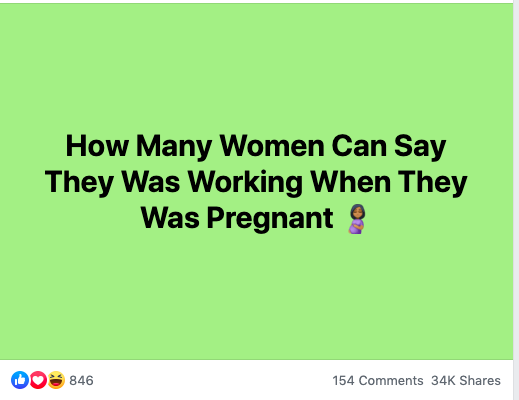Written by Nicole J.
Maternal mortality is a hot topic of late, with more light shed on the statistic among black mothers-to-be since Serena Williams Ohanian’s experience with her delivery two years ago. Now, I am by no means a sociologist, statistician, or a doctor, but I believe there are other factors at play that contribute the black maternal mortality rate which I will try and unwrap in this blog.
As the black community is wont to do, the first instance is blame white people for our problems. Now, I’m not denying the very real problem of medical racism. White and other nonblack doctors exist in a bizarre dichotomy where they view black women as strong, superhuman magic women capable of doing it all, therefore not believing patient-reported complaints of pain, distress, or difficulty, and also histrionic drama queens who are only come to the hospital to get high off prescription pain medicine and waste time. With more black people heading to medical school and other allied health professions, there should hopefully be a shift in these behaviors. However, like I said, I think there’s more to the maternal mortality rate than a racist OB/GYN, such as:

Every so often I see posts like the above shared in tag groups on social media, many times posted by men. Many women flock to the comments section to happily raise their had to say they did, as if it is some badge of honor. I touched on this in my blog about black mothers of twins, where two different mothers were praised for either working or in school right up until delivery, and one was back at school the week after.
There is nothing wrong with working until the due date, but only if a mother wants to, has a job that is not strenuous, and has been cleared to do so by her doctor. It is a whole thing entirely to be working long hours when she’s supposed to be on bed rest due to potential complications, because the absence or reduction of a single paycheck means the difference between making rent and homelessness. Is it any wonder that maternal mortality is worsened when a mother is made work until her water breaks so that her ends meet?
I don’t know when exactly it happened, but black love has increasingly become synonymous with struggle love, and struggling before, during, and after a stress like birth is bound to have a negative effect on both the mother and the child.
As it stands, the out of wedlock birth rate is inching ever closer to 80%. That means about 4 out of 5 black babies are born to baby-mamas and baby-daddies, rather than husband and wife. And as we all know, whether anecdotally in our personal lives, via television and movies, or on social media, many black fathers do not value fatherhood or their heirs, and have no qualms with leaving the mother as a single parent. That mother is then made to depend on herself, her mother, who already did her time raising children, or the kindness of strangers. When a black mom is discharged from the hospital with little to no idea of how her newborn will be cared for once her 6 to 12 weeks of maternity leave is over, again, no wonder there is increased maternal mortality.
This blog originated No Wedding No Womb, so you know where this platform stands on having babies at inopportune times: don’t do it! If you have a functioning uterus, and are engaging in intercourse with a man with viable sperm and you’re neither married nor ready for a baby, you need to be on not one but TWO forms of reliable birth control and doing all you can to prevent getting pregnant before ready for the challenges of motherhood. You can’t be a maternal mortality statistic if you’re not out here birthing recklessly!
Black women are leading the pack with conditions like high blood pressure, diabetes, and obesity, at younger and younger ages. These three stressors combined with pregnancy can no doubt negatively impact a mother’s health, culminating in her premature death.
Maybe this is a bit of a reach, but I feel like chemicals in relaxers over time can disrupt hormones and cycles and the like. It’s already been shown that black women get fibroids more than other races of women and it has been linked to relaxers. Perhaps decades of getting hydroxide and other mainstays from a chemistry lab fundamentally changes black women’s bodies to the point where a significant hormonal shift like pregnancy triggers a yet-undiscovered cascade of problems leading to our high maternal mortality.
Motherhood is difficult, even in the best of circumstances. It takes a toll on mind, body, and bank balance. One of the best ways to be a mother is to ensure that you are as prepared as possible for the difficulties one might encounter in that chapter of life. What else do you think contributes to the high maternal mortality rate among black women? Let’s hear it in the comments.